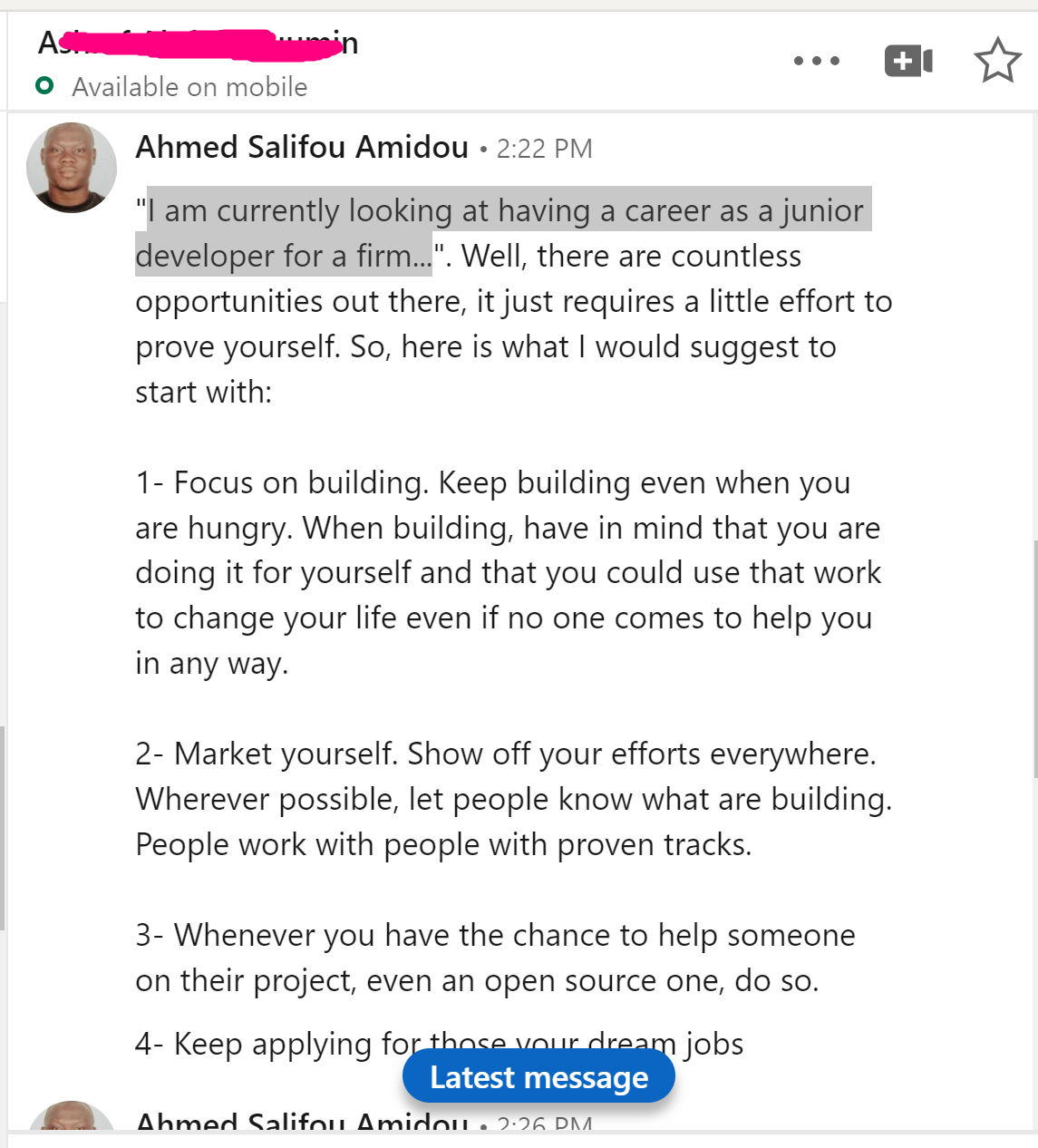4 actions I would take if I were beginning my developer career today
To build a successful career as a software developer, and even in other disciplines for that matter, requires a consistant and deliberate actions. Recently, in a response to a student, I mentioned that there are countless jobs out there waiting for people to take them. But the issue is that in most cases, we do not satisfy the basic requirements.

I gave that advice, not because I applied it then when I started, no, that advice is my final realization after I failed to apply it on time. Yes, that's what I should have done to be more successful in my career as a developer.
I have made so many mistakes, some intentionally, some not. So, I want to share with you a few tricks that could save you from making the same mistakes in your career.
1. Record all your projects
Keep a clean record of every single project you work on, These can be a personal or professional project or even a school assignment. Every single thing, trust me.
Record the date, your position or role you played, what task you worked on, etc. If possible, have your source codes and any other assets related to the work. The dates are important as well because they allow you to know the exact chronology of these events.
You do this to make it easy to tell the experience you have and prove it:
- You have clear proof of your experience
- You can tell the time of experience you have
- Keep a track of your professional development
- It will help you to keep your resume up to date
- It will help you to prepare for interviews
- Good souvenirs
What are some examples of personal projects that can help me build a portfolio as a developer?
Personal projects can be anything that interests you. For example, you could create a web application, a mobile app, a game, or even a simple script that automates a task. The important thing is that you have something to show potential employers that demonstrates your skills as a developer. Here are some examples of personal projects you could work on:
- A web application that helps users track their expenses
- A mobile app that allows users to create and share their workout routines as I did with futuretodo
- A game that you code from scratch
- A script that automates a task such as data entry or file management
Remember, the sky is the limit when it comes to personal projects. Choose something that interests you and that you feel passionate about, and let your creativity shine!
2. Create many personal projects
Along the way, you will have clients for yourself, or you will work for a company. But the most important projects are those you build for yourself.
Why are your projects the most important ones?
As time goes by, clients tend to neglect their projects or simply go out of business for whatever reasons. You cannot count on their projects all the time to showcase your work. On the other hand, you can do your best to maintain your project active, or in the worse scenarion, you can show them on your computer.
Personal projects are a fantastic way to build a portfolio and demonstrate your skills. They also allow you to explore areas of interest, experiment with new technologies, and showcase your creativity. Unlike client projects, personal projects are entirely under your control, giving you the freedom to implement your ideas and solutions.
3. I would learn how to design
I know, you might tell me you are a backend developer or so. Remember those personal projects? Well, you might have to work on every aspect alone. This means you will have to involve yourself with frontend, UI, UX, Backend, and even Marketing.
A particular thing I have come to realize recently is how powerful CSS is. It convinces investors. When CSS is well used, it creates beauty in products. Even YouTubers know that. When they show you a project to build in a video using React, VueJS, etc. It's usually the beauty of that project that convinces you to have a look at it. But, that beauty is manifested by CSS, or should I say design skills.
So, If were to start learning today, I would go for some design classes, and then take learning CSS very seriously. It's an invaluable asset. In addition to that I would learn some other modern design tools such as Figma, UI/UX, Photoshop, Adobe Premiere AfterEffect, etc. Just a little.
Developing design skills is a valuable asset for a developer. Knowing how to create visually appealing and user-friendly interfaces can set you apart in the job market.
4. Work in the corporate world to understand how bureaucracy works
Experience in a corporate environment provides valuable insights into how large organizations operate, including their workflows, hierarchies, and decision-making processes.
Understanding corporate culture and navigating bureaucracy can enhance your ability to collaborate with diverse teams, communicate effectively, and adapt to different work environments. This experience can be particularly beneficial if you plan to work on larger projects or within established companies.
Conclusion
Overall, combining technical skills with effective project management, creativity, and an understanding of the professional landscape will position you for success in your developer career. Keep adapting and learning as the industry evolves, and don't hesitate to explore new technologies and methodologies.
